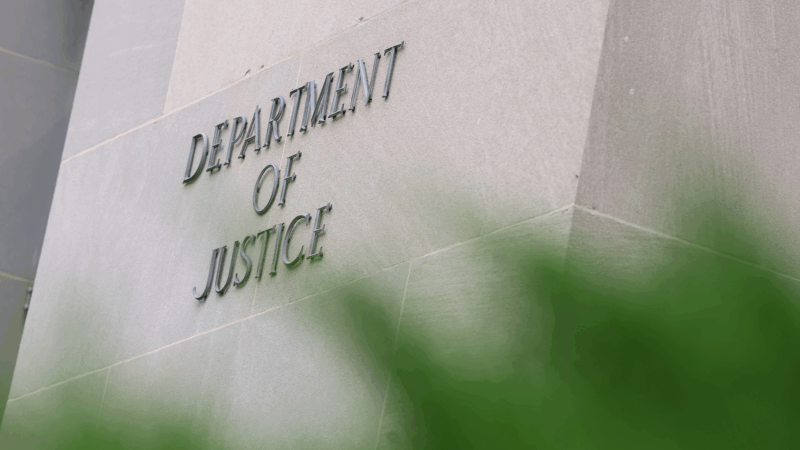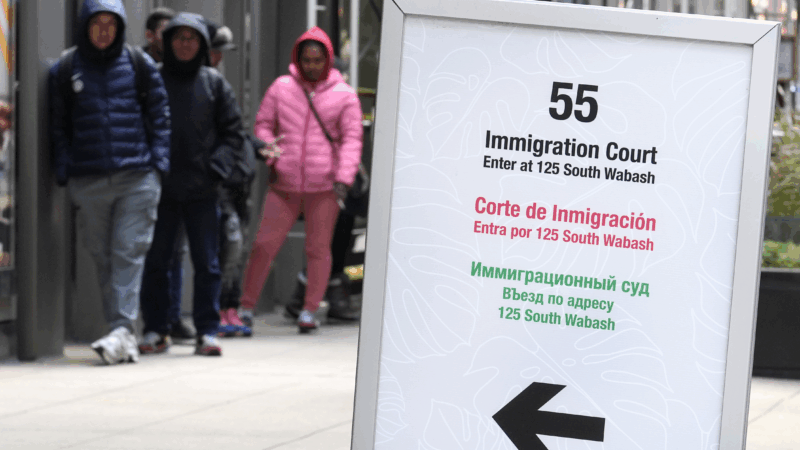The DOJ sued the federal district bench in Maryland. A judge just dismissed the case
A federal judge on Tuesday turned away a lawsuit the Justice Department filed against the entire federal court bench in the state of Maryland, reasoning that the lawsuit went against precedent and the rule of law.
U.S. District Judge Thomas Cullen of Roanoke, Va., had been specially tapped to oversee the case, after DOJ named all 15 federal district court judges in Maryland as defendants in the civil lawsuit.
The Trump administration says the Maryland court exceeded its authority and violated the law when it imposed a temporary, 48-hour freeze on deportations for any migrant who filed a petition challenging their detention.
“Like other government officials, judges sometimes violate the law,” the Department of Justice wrote. “This case involves an extraordinary form of judicial interference in Executive prerogatives.”
But Cullen dismissed that argument, arguing the Department of Justice could normally have appealed specific decisions in specific cases, or petitioned the judicial council to change the local rules in Maryland if it didn’t like them.
“But as events over the past several months have revealed, these are not normal times—at least regarding the interplay between the Executive and this coordinate branch of government. It’s no surprise that the Executive chose a different, and more confrontational, path entirely” by deciding to sue, Cullen wrote in his opinion.
He said he was dismissing the case because it’s a dispute between the judiciary and the executive that can’t be litigated in this way in a district court, by suing all the judges.
“To hold otherwise would run counter to overwhelming precedent, depart from longstanding constitutional tradition, and offend the rule of law,” he wrote.
Supreme Court advocate Paul Clement defends
In normal cases, the Justice Department defends judges when they are sued. But because it was DOJ doing the suing, the judges enlisted prominent Supreme Court advocate Paul Clement, who served as solicitor general in the George W. Bush years.
“The executive branch seeks to bring suit in the name of the United States against a co-equal branch of government,” Clement said at a recent court hearing. “There really is no precursor for this suit.”
The judges also received backing in the form of friend of the court briefs from the Maryland State Bar Association, dozens of law firms and 11 retired federal judges. Other former jurists affiliated with the nonprofit Keep Our Republic’s Article III Coalition also spoke out for the judicial defendants.
“It was a sensible step. It’s something courts do all the time,” said Philip Pro, a retired federal judge from Nevada who was appointed by President Ronald Reagan. “A two-business-day extension is such a reasonable and brief period that I don’t think it could frustrate any executive powers. That’s a crisis that’s made by the executive with their timing.”
Lingering in the background is the case of Kilmar Abrego Garcia. He’s the man from El Salvador, living in Maryland, who was deported back to his home country despite a judicial order barring his deportation, in what the Justice Department called an “administrative error.” After weeks in a brutal prison, he’s now back in the U.S. and back in federal custody, fighting criminal charges and another deportation.
Lindsey Vonn says she suffered ‘complex tibia fracture’ in her Olympic downhill crash
The 41-year-old star said her torn ACL was not a factor in her crash. "While yesterday did not end the way I had hoped, and despite the intense physical pain it caused, I have no regrets," she wrote.
Guerilla Toss embrace the ‘weird’ on new album
On You're Weird Now, the band leans into difference with help from producer Stephen Malkmus.
Nancy Guthrie search enters its second week as a purported deadline looms
"This is very valuable to us, and we will pay," Savannah Guthrie said in a new video message, seeking to communicate with people who say they're holding her mother.
Immigration courts fast-track hearings for Somali asylum claims
Their lawyers fear the notices are merely the first step toward the removal without due process of Somali asylum applicants in the country.
Ilia Malinin’s Olympic backflip made history. But he’s not the first to do it
U.S. figure skating phenom Ilia Malinin did a backflip in his Olympic debut, and another the next day. The controversial move was banned from competition for decades until 2024.
‘Dizzy’ author recounts a decade of being marooned by chronic illness
Rachel Weaver worked for the Forest Service in Alaska where she scaled towering trees to study nature. But in 2006, she woke up and felt like she was being spun in a hurricane. Her memoir is Dizzy.






